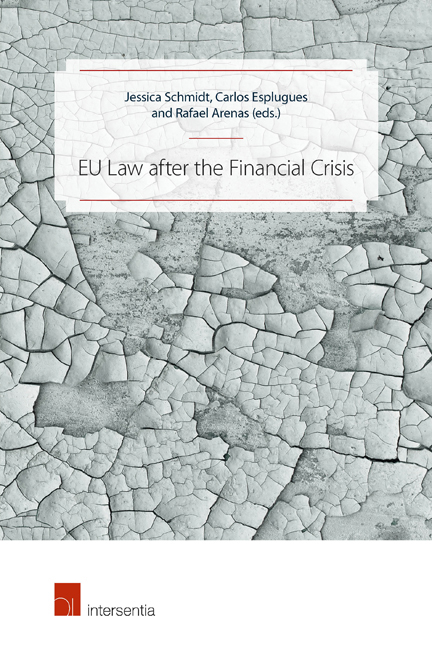Book contents
- Frontmatter
- Contents
- List of Abbreviations
- List of Authors
- Introduction
- PART I RESCUE MECHANISMS AND MONETARY POLICY
- PART II THE IMPACT OF THE FINANCIAL CRISIS ON THE BANKING SECTOR AND CAPITAL MARKETS
- Financial Crisis and European Company and Capital Markets Law
- CoCo Bonds as a Means of Reducing Systemic Risk and their Role within New Regulatory Regimes
- Is EU Financial Law Overly Complex?
- PART III THE FINANCIAL CRISIS AND TAX LAW
- PART IV THE FINANCIAL CRISIS, CONSUMERS AND CONSUMER LAW
- PART V THE FINANCIAL CRISIS AND COMPETITION LAW
- PART VI THE FINANCIAL CRISIS, RESTRUCTURING AND INSOLVENCY LAW
- PART VII THE SOCIAL DIMENSION OF THE FINANCIAL CRISIS AND EU CITIZENSHIP
- PART VIII REFLECTIONS ON THE IMPACT OF THE FINANCIAL CRISIS ON THE GENERAL EUROPEAN LEGAL FRAMEWORK AND THE FUNDAMENTAL “EUROPEAN IDEA”
Is EU Financial Law Overly Complex?
from PART II - THE IMPACT OF THE FINANCIAL CRISIS ON THE BANKING SECTOR AND CAPITAL MARKETS
Published online by Cambridge University Press: 13 December 2017
- Frontmatter
- Contents
- List of Abbreviations
- List of Authors
- Introduction
- PART I RESCUE MECHANISMS AND MONETARY POLICY
- PART II THE IMPACT OF THE FINANCIAL CRISIS ON THE BANKING SECTOR AND CAPITAL MARKETS
- Financial Crisis and European Company and Capital Markets Law
- CoCo Bonds as a Means of Reducing Systemic Risk and their Role within New Regulatory Regimes
- Is EU Financial Law Overly Complex?
- PART III THE FINANCIAL CRISIS AND TAX LAW
- PART IV THE FINANCIAL CRISIS, CONSUMERS AND CONSUMER LAW
- PART V THE FINANCIAL CRISIS AND COMPETITION LAW
- PART VI THE FINANCIAL CRISIS, RESTRUCTURING AND INSOLVENCY LAW
- PART VII THE SOCIAL DIMENSION OF THE FINANCIAL CRISIS AND EU CITIZENSHIP
- PART VIII REFLECTIONS ON THE IMPACT OF THE FINANCIAL CRISIS ON THE GENERAL EUROPEAN LEGAL FRAMEWORK AND THE FUNDAMENTAL “EUROPEAN IDEA”
Summary
I want to emphasise a particular point about the current state of the law of the European Union. To me, the most striking feature of financial regulation after the financial crisis is its complexity. Lawyers rarely complain in public about complexity. Coping with it is considered to be their job. I also do not wish to simply complain about the challenges that are common to all those who work with the piles of new legislation emanating from Brussels. The point I want to make is that complexity is problematic because it itself puts the stability of financial markets at risk. Let me explain this in more detail.
Over the last few years a “regulatory tsunami” has swept over Europe. New topics such as short sales, alternative investment fund managers and credit rating agencies have caught Brussels's attention and subsequently been thrust into the limelight. In addition, many of the already existing texts have been overhauled and substantially expanded, like the MiFID or the Market Abuse Directive, which in their second generation are now both accompanied by regulations. These provisions are supplemented by delegated acts that the Commission adopts on the so-called “Level 2”.
The EU has not stopped there, but has also created new institutions besides the traditional ones. In 2011, the three European Supervisory Agencies, EBA, ESMA and EIOPA, plus the ESRB, were created. It took only another three years to add a new Supervisory Board within the ECB and a Single Resolution Board (SRB). Most of these institutions also produce texts, such as guidelines and recommendations. They are called “Level 3” and their practical value is similar to legislation. A further layer of complexity arises from the fact that the directives need to be transposed into national law, where again supervisory institutions may adopt their own guidelines to interpretation.
The sheer volume of the texts is staggering. To take one example, the MiFID II occupies about 148 pages in the Official Journal. Its Preamble has no less than 160 Recitals. The MiFIR, which accompanies it, takes another 65 pages in the Official Journal.
- Type
- Chapter
- Information
- EU Law after the Financial Crisis , pp. 65 - 68Publisher: IntersentiaPrint publication year: 2016



